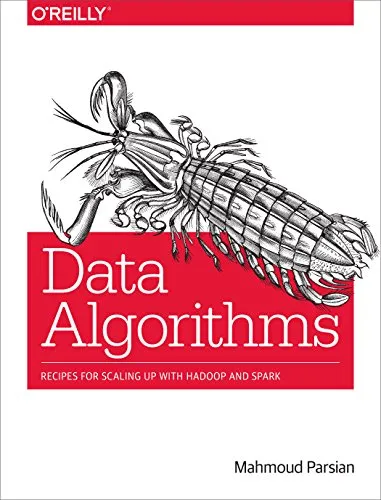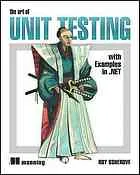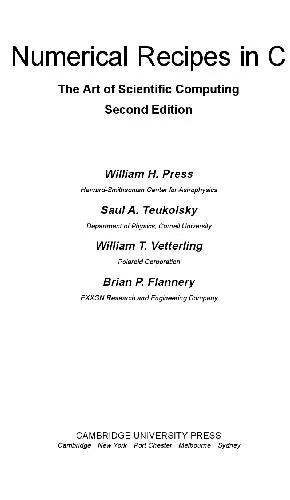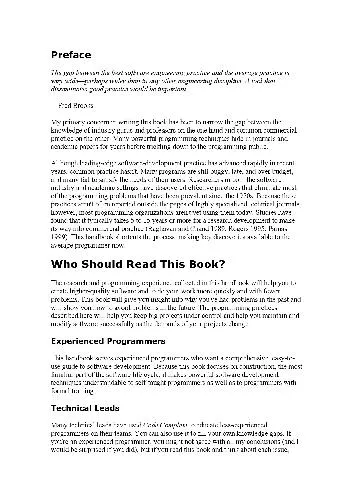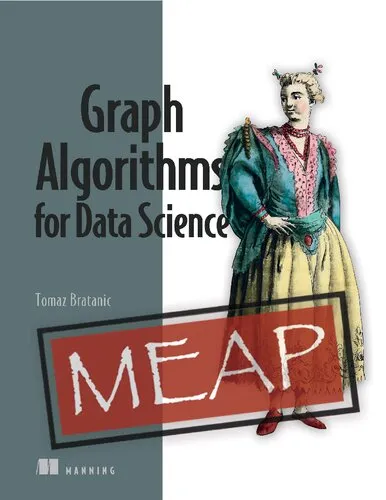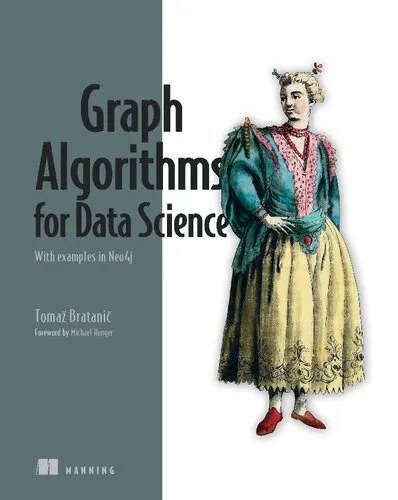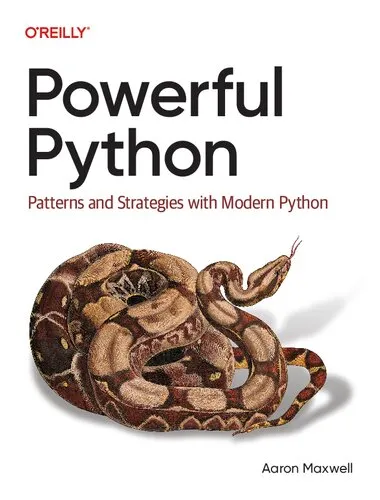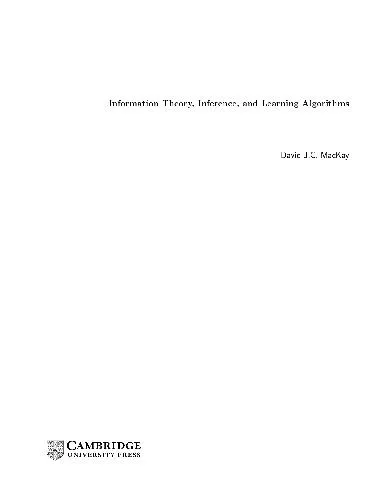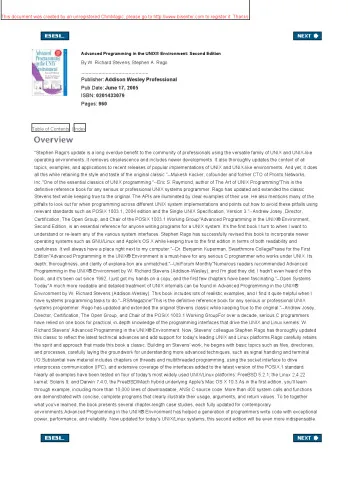International Journal of Software Engineering and Knowledge Engineering
4.5
بر اساس نظر کاربران

شما میتونید سوالاتتون در باره کتاب رو از هوش مصنوعیش بعد از ورود بپرسید
هر دانلود یا پرسش از هوش مصنوعی 2 امتیاز لازم دارد، برای بدست آوردن امتیاز رایگان، به صفحه ی راهنمای امتیازات سر بزنید و یک سری کار ارزشمند انجام بدینکتاب های مرتبط:
معرفی جامع کتاب International Journal of Software Engineering and Knowledge Engineeringpp.107—119
کتاب International Journal of Software Engineering and Knowledge Engineering pp.107—119 اثری علمی و مرجع در حوزه Software Engineering و Knowledge Engineering است که توسط KAINDL, HERMANN و ZIEGELER, HOLGER G. نگارش یافته است. این کتاب نه یک اثر عمومی، بلکه یک پژوهش تخصصی است که با رویکرد علمی به بررسی چالشها و راهکارهای مهندسی نرمافزار و مهندسی دانش میپردازد. اهمیت این اثر در آن است که با نگاه ترکیبی میان این دو شاخه، بینش تازهای برای توسعه و مدیریت سیستمهای پیچیده نرمافزاری فراهم میآورد.
خلاصه تفصیلی کتاب
این کتاب در صفحات 107 تا 119 یک مجموعه دقیق از یافتههای پژوهشی و تحلیلی را ارائه میکند که در محورهای اصلی زیر خلاصه میشود:
- بررسی تعامل میان Software Engineering و Knowledge Engineering و نقش آنها در بهبود کیفیت سیستمهای نرمافزاری.
- تحلیل عمیق چگونگی یکپارچهسازی فرآیندهای مهندسی دانش در چرخه عمر توسعه نرمافزار.
- ارائه مدلها و چارچوبهایی که امکان مدیریت بهتر نیازمندیها و طراحی سیستم را فراهم میآورند.
- معرفی رویکردهای نوین برای مدیریت پیچیدگی در پروژههای نرمافزاری بزرگ.
نویسندگان تلاش کردهاند تا نشان دهند که مرز میان دانش ضمنی و دانش صریح در مهندسی نرمافزار چگونه میتواند با ابزارها و روشهای مهندسی دانش شفافتر شود. آنها همچنین مثالهایی واقعی از پروژههای صنعتی را بررسی کردهاند تا ارتباط میان تئوری و عمل را به وضوح به نمایش بگذارند.
مهمترین نکات (Key Takeaways)
- نیاز به همافزایی میان Software Engineering و Knowledge Engineering برای موفقیت پروژههای بزرگ نرمافزاری.
- اهمیت مدیریت چرخه حیات دانش در فرآیند توسعه نرمافزار.
- ضرورت استفاده از مدلسازی دقیق برای کاهش ابهام در مراحل تحلیل و طراحی.
- ارزش روشهای ترکیبی که از هر دو حوزه برای حل مشکلات پیچیده بهره میبرند.
- پیشنهاد ابزارهای جدید و روشهای سیستماتیک برای بهبود بهرهوری تیمهای توسعه.
جملات شاخص از کتاب
"ادغام مهندسی نرمافزار و مهندسی دانش، آینده توسعه سیستمهای هوشمند و قابل اطمینان را شکل میدهد."
"کیفیت نرمافزار نه تنها به کد نوشتهشده، بلکه به کیفیت دانش سازماندهی شده در پس آن بستگی دارد."
چرا این کتاب اهمیت دارد؟
در دنیای امروز که پیچیدگی نرمافزارها و سیستمهای اطلاعاتی به طرز چشمگیری افزایش یافته است، نیاز به رویکردهای تلفیقی و هوشمندانه بیش از هر زمان دیگری احساس میشود. این کتاب نه تنها برای پژوهشگران بلکه برای مدیران پروژه و توسعهدهندگان نرمافزار یک منبع ارزنده است. اهمیت آن در چند نکته کلیدی نهفته است:
- ارائه راهکارهایی عملی و علمی برای غلبه بر مشکلات متداول پروژههای نرمافزاری بزرگ.
- ایجاد پلی میان نظریه و عمل با استفاده از مطالعات موردی واقعی.
- گسترش بینش بینرشتهای که میتواند به نوآوری در صنعت نرمافزار منجر شود.
- کمک به درک بهتر نقش دانش در کل چرخه تولید نرمافزار.
از منظر SEO و جستجوپذیری علمی، کتاب International Journal of Software Engineering and Knowledge Engineering pp.107—119 توانسته است جایگاه ویژهای در میان منابع معتبر مهندسی نرمافزار و مهندسی دانش پیدا کند. با توجه به افزایش نیاز به رویکردهای یکپارچه در توسعه نرمافزار، مطالعه این اثر برای هر فردی که در این مسیر گام برمیدارد ضروری است.
Detailed Summary of the Book
The work published by KAINDL, HERMANN and ZIEGELER, HOLGER G. in the International Journal of Software Engineering and Knowledge Engineering (pp. 107–119) is a highly regarded scholarly contribution in the fields of software engineering and knowledge-based systems. This publication critically addresses the intersection of structured software development processes and the effective management of knowledge within those processes. It lays out both a theoretical foundation and practical insights that aim to bridge the gap between software engineering methodologies and the growing need for intelligent, automated knowledge handling.
The authors explore essential challenges such as requirements engineering, conceptual modeling, and the dynamic integration of domain knowledge into software design. They emphasize the importance of aligning technical implementation with clear semantic understanding, ensuring systems not only function correctly but also remain adaptable in rapidly changing technological environments.
Through detailed case studies and illustrative examples, the publication demonstrates how knowledge engineering principles can enhance decision-making, reduce development costs, and improve software quality. The blend of rigorous academic analysis and practical guidance makes this piece significant for both researchers and industry practitioners seeking to harmonize system design, architecture, and real-world constraints.
Key Takeaways
- Integrating knowledge engineering with software development leads to more adaptive and intelligent systems.
- Requirements analysis is most effective when informed by domain-specific knowledge structures.
- Conceptual modeling serves as an essential bridge between technical specification and user-centered design.
- Automated tools and AI-driven approaches can significantly enhance the long-term maintainability of systems.
- Knowledge representations must remain flexible to accommodate evolving business and technological landscapes.
- Collaborative approaches between software engineers and domain experts yield superior results.
Famous Quotes from the Book
While the publication is primarily academic and technical in nature, it includes several statements that capture its intellectual spirit:
"The synergy between software engineering and knowledge engineering is not optional—it is integral to the systems of tomorrow."
"Capturing the essence of a domain enables not just software creation, but knowledge preservation."
"In a rapidly evolving digital world, adaptability is engineered not in code alone, but in conceptual clarity."
Why This Book Matters
This paper stands as a meaningful resource in the academic and professional communities because it addresses a multi-disciplinary challenge: how to effectively incorporate knowledge engineering practices into the formal processes of software development. In an era where software systems increasingly need to reason, adapt, and make decisions, the methodologies discussed by KAINDL and ZIEGELER offer a roadmap for designing such capabilities into systems from the ground up.
By thoroughly analyzing the overlap between structured programming approaches and explicit knowledge representation, the authors highlight pathways to increase efficiency, reduce redundancy, and improve the resilience of systems under changing demands. These considerations have become even more relevant with the growth of AI, IoT, and data-intensive applications.
Moreover, the publication's structured methodology can be applied to a broad set of industries—ranging from healthcare and finance to manufacturing and education—where domain knowledge must be embedded into complex software solutions. The approach advocated encourages deeper collaboration, greater clarity in problem-solving, and innovation grounded in disciplined engineering practices.
Overall, this work is more than a research paper—it is a conceptual bridge linking theoretical computer science with practical systems engineering, ensuring that future software development is as intelligent in design as it is efficient in execution.
دانلود رایگان مستقیم
شما میتونید سوالاتتون در باره کتاب رو از هوش مصنوعیش بعد از ورود بپرسید
دسترسی به کتابها از طریق پلتفرمهای قانونی و کتابخانههای عمومی نه تنها از حقوق نویسندگان و ناشران حمایت میکند، بلکه به پایداری فرهنگ کتابخوانی نیز کمک میرساند. پیش از دانلود، لحظهای به بررسی این گزینهها فکر کنید.
این کتاب رو در پلتفرم های دیگه ببینید
WorldCat به شما کمک میکنه تا کتاب ها رو در کتابخانه های سراسر دنیا پیدا کنید
امتیازها، نظرات تخصصی و صحبت ها درباره کتاب را در Goodreads ببینید
کتابهای کمیاب یا دست دوم را در AbeBooks پیدا کنید و بخرید
1426
بازدید4.5
امتیاز0
نظر98%
رضایتنظرات:
4.5
بر اساس 0 نظر کاربران
Questions & Answers
Ask questions about this book or help others by answering
No questions yet. Be the first to ask!



